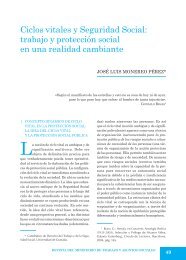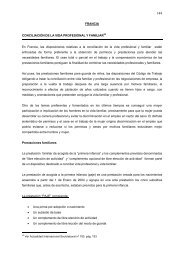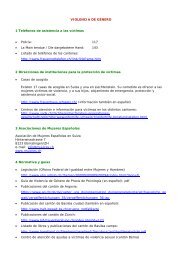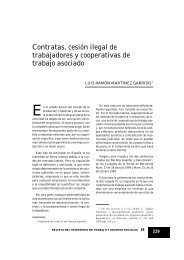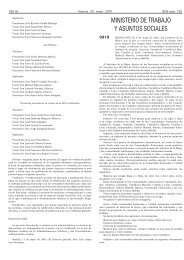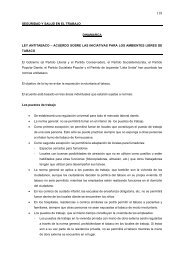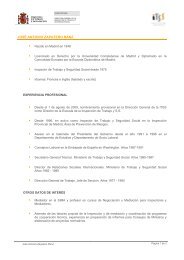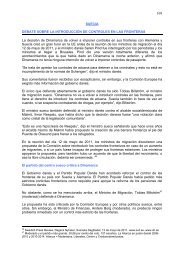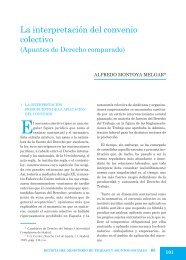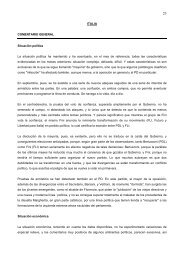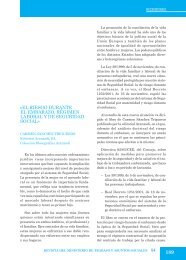- Page 1 and 2:
NIPO: 790-11-062-0 93
- Page 3 and 4:
La Revista del Ministerio de Trabaj
- Page 5 and 6:
4 La movilidad (voluntaria, forzosa
- Page 8 and 9:
Editorial ALFREDO MONTOYA MELGAR* E
- Page 10 and 11:
ALFREDO MONTOYA MELGAR dades de la
- Page 12:
Informes y Estudios
- Page 15 and 16:
14 INFORMES Y ESTUDIOS «contratos
- Page 17 and 18:
16 INFORMES Y ESTUDIOS Como es sabi
- Page 19 and 20:
18 INFORMES Y ESTUDIOS completament
- Page 21 and 22:
20 INFORMES Y ESTUDIOS debe constit
- Page 23 and 24:
22 INFORMES Y ESTUDIOS empresas de
- Page 25 and 26:
24 INFORMES Y ESTUDIOS nacionales d
- Page 27 and 28:
26 INFORMES Y ESTUDIOS Por su parte
- Page 29 and 30:
28 INFORMES Y ESTUDIOS de trabajo f
- Page 31 and 32:
30 INFORMES Y ESTUDIOS aplicación
- Page 33 and 34:
32 INFORMES Y ESTUDIOS dad; sin emb
- Page 35 and 36:
34 INFORMES Y ESTUDIOS hay en caso
- Page 37 and 38:
36 INFORMES Y ESTUDIOS - Derecho a
- Page 39 and 40:
38 INFORMES Y ESTUDIOS un criterio
- Page 41 and 42:
40 INFORMES Y ESTUDIOS supletoria l
- Page 43 and 44:
42 INFORMES Y ESTUDIOS no se contem
- Page 45 and 46:
44 INFORMES Y ESTUDIOS mientras que
- Page 47 and 48:
46 INFORMES Y ESTUDIOS RESUMEN Part
- Page 49 and 50:
48 INFORMES Y ESTUDIOS puro contrat
- Page 51 and 52:
50 INFORMES Y ESTUDIOS 2. ÁMBITO S
- Page 53 and 54:
52 INFORMES Y ESTUDIOS establecido
- Page 55 and 56: 54 INFORMES Y ESTUDIOS criterios ob
- Page 57 and 58: 56 INFORMES Y ESTUDIOS tes que acre
- Page 59 and 60: 58 INFORMES Y ESTUDIOS cionalmente)
- Page 61 and 62: 60 INFORMES Y ESTUDIOS Al margen de
- Page 63 and 64: 62 INFORMES Y ESTUDIOS la política
- Page 65 and 66: 64 INFORMES Y ESTUDIOS admite la in
- Page 67 and 68: 66 INFORMES Y ESTUDIOS ocurre con l
- Page 69 and 70: 68 INFORMES Y ESTUDIOS público, co
- Page 71 and 72: 70 INFORMES Y ESTUDIOS el sistema q
- Page 73 and 74: 72 INFORMES Y ESTUDIOS mulas de col
- Page 75 and 76: 74 INFORMES Y ESTUDIOS En fin, tras
- Page 77 and 78: 76 INFORMES Y ESTUDIOS RESUMEN En e
- Page 79 and 80: 78 INFORMES Y ESTUDIOS prendiendo (
- Page 81 and 82: 80 INFORMES Y ESTUDIOS cipio sumame
- Page 83 and 84: 82 INFORMES Y ESTUDIOS nos económi
- Page 85 and 86: 84 INFORMES Y ESTUDIOS a todas las
- Page 87 and 88: 86 INFORMES Y ESTUDIOS rializados e
- Page 89 and 90: 88 INFORMES Y ESTUDIOS traciones P
- Page 91 and 92: 90 INFORMES Y ESTUDIOS empleador y
- Page 93 and 94: 92 INFORMES Y ESTUDIOS esas pautas
- Page 95 and 96: 94 INFORMES Y ESTUDIOS 3.2. Concept
- Page 97 and 98: 96 INFORMES Y ESTUDIOS empleados p
- Page 99 and 100: 98 INFORMES Y ESTUDIOS Administraci
- Page 101 and 102: 100 INFORMES Y ESTUDIOS Tal vez por
- Page 103 and 104: 102 INFORMES Y ESTUDIOS en la que e
- Page 105: 104 INFORMES Y ESTUDIOS blecidas en
- Page 109 and 110: 108 INFORMES Y ESTUDIOS divergentes
- Page 111 and 112: 110 INFORMES Y ESTUDIOS diciones de
- Page 113 and 114: 112 INFORMES Y ESTUDIOS sentido, el
- Page 115 and 116: 114 INFORMES Y ESTUDIOS del EBEP, l
- Page 117 and 118: 116 INFORMES Y ESTUDIOS EBEP, es ba
- Page 119 and 120: 118 INFORMES Y ESTUDIOS legítimo o
- Page 121 and 122: 120 INFORMES Y ESTUDIOS vo proceden
- Page 123 and 124: 122 INFORMES Y ESTUDIOS encuentre h
- Page 125 and 126: 124 INFORMES Y ESTUDIOS La situaci
- Page 127 and 128: 126 INFORMES Y ESTUDIOS la reducci
- Page 129 and 130: 128 INFORMES Y ESTUDIOS ción porme
- Page 131 and 132: 130 INFORMES Y ESTUDIOS ya señalad
- Page 133 and 134: 132 INFORMES Y ESTUDIOS mejor derec
- Page 135 and 136: 134 INFORMES Y ESTUDIOS Texto Refun
- Page 137 and 138: 136 INFORMES Y ESTUDIOS cas distint
- Page 139 and 140: 138 INFORMES Y ESTUDIOS existen int
- Page 141 and 142: 140 INFORMES Y ESTUDIOS de actuaci
- Page 143 and 144: 142 INFORMES Y ESTUDIOS de Real Dec
- Page 145 and 146: 144 INFORMES Y ESTUDIOS RESUMEN El
- Page 147 and 148: 146 INFORMES Y ESTUDIOS late on asp
- Page 149 and 150: 148 INFORMES Y ESTUDIOS en que est
- Page 151 and 152: 150 INFORMES Y ESTUDIOS negociació
- Page 153 and 154: 152 INFORMES Y ESTUDIOS contribuir
- Page 155 and 156: 154 INFORMES Y ESTUDIOS abril de 19
- Page 157 and 158:
156 INFORMES Y ESTUDIOS tario, y, d
- Page 159 and 160:
158 INFORMES Y ESTUDIOS personal, e
- Page 161 and 162:
160 INFORMES Y ESTUDIOS que sólo r
- Page 163 and 164:
162 INFORMES Y ESTUDIOS dando mayor
- Page 165 and 166:
164 INFORMES Y ESTUDIOS dicha situa
- Page 168 and 169:
La negociación colectiva de los em
- Page 170 and 171:
otro, modificar en determinados cas
- Page 172 and 173:
cado una parte de la doctrina; es d
- Page 174 and 175:
se podría constituir en cada una d
- Page 176 and 177:
personal. Y tampoco creemos que pue
- Page 178 and 179:
es de empresa o superior se aplican
- Page 180 and 181:
caso de que en el proceso de negoci
- Page 182 and 183:
3. LIMITACIONES QUE TIENE LA NEGOCI
- Page 184 and 185:
• El principio de legalidad Las A
- Page 186 and 187:
(esta doctrina se recoge en el Auto
- Page 188 and 189:
cífica del principio de legalidad.
- Page 190 and 191:
Superiores de Justicia de las Comun
- Page 192 and 193:
ciación colectiva que se desarroll
- Page 194 and 195:
En fin, como vemos la doctrina cons
- Page 196 and 197:
Gobierno para dictar un RDL; se rec
- Page 198 and 199:
4.1.2. En relación con las indicad
- Page 200 and 201:
ducido una intervención legislativ
- Page 202 and 203:
nio colectivo. Por eso también aqu
- Page 204 and 205:
los Ministerios de Economía y Haci
- Page 206 and 207:
tende, en ningún caso, que no se a
- Page 208 and 209:
gando también estos asuntos a la j
- Page 210:
ESTEBAN RODRÍGUEZ VERA ABSTRACT In
- Page 213 and 214:
212 INFORMES Y ESTUDIOS otros aspec
- Page 215 and 216:
214 INFORMES Y ESTUDIOS la reducci
- Page 217 and 218:
216 INFORMES Y ESTUDIOS EL RECORTE
- Page 219 and 220:
218 INFORMES Y ESTUDIOS durante su
- Page 221 and 222:
220 INFORMES Y ESTUDIOS vada, en pa
- Page 223 and 224:
222 INFORMES Y ESTUDIOS nal laboral
- Page 225 and 226:
224 INFORMES Y ESTUDIOS ría de los
- Page 227 and 228:
226 INFORMES Y ESTUDIOS bir una ret
- Page 229 and 230:
228 INFORMES Y ESTUDIOS sobre los c
- Page 231 and 232:
230 INFORMES Y ESTUDIOS RESUMEN La
- Page 233 and 234:
232 INFORMES Y ESTUDIOS sitúa en e
- Page 235 and 236:
234 INFORMES Y ESTUDIOS competencia
- Page 237 and 238:
236 INFORMES Y ESTUDIOS cación sin
- Page 239 and 240:
238 INFORMES Y ESTUDIOS causa, el n
- Page 241 and 242:
240 INFORMES Y ESTUDIOS culo 36.1 d
- Page 243 and 244:
242 INFORMES Y ESTUDIOS colectivo,
- Page 245 and 246:
244 INFORMES Y ESTUDIOS otra que la
- Page 247 and 248:
246 INFORMES Y ESTUDIOS Urbanos de
- Page 249 and 250:
248 INFORMES Y ESTUDIOS régimen de
- Page 251 and 252:
250 INFORMES Y ESTUDIOS gidos en la
- Page 253 and 254:
252 INFORMES Y ESTUDIOS La divergen
- Page 255 and 256:
254 INFORMES Y ESTUDIOS estatuto de
- Page 257 and 258:
256 INFORMES Y ESTUDIOS estar al pr
- Page 259 and 260:
258 INFORMES Y ESTUDIOS sería de a
- Page 261 and 262:
260 INFORMES Y ESTUDIOS 7. CONCLUSI
- Page 264 and 265:
La movilidad (voluntaria, forzosa..
- Page 266 and 267:
Será en exclusiva de la segunda de
- Page 268 and 269:
ase en su facultad organizativa de
- Page 270 and 271:
que tener presente que esta temáti
- Page 272 and 273:
Puede afirmarse, por tanto, que se
- Page 274 and 275:
al, a lo dispuesto por la Ley 30/19
- Page 276 and 277:
FRANCISCO JAVIER HIERRO HIERRO •
- Page 278 and 279:
entre funcionarios en activo o en e
- Page 280 and 281:
caso, criterios objetivos relaciona
- Page 282 and 283:
En cuanto al resto de elementos que
- Page 284 and 285:
ajadores asalariados. Sin embargo,
- Page 286 and 287:
les del servicio, no pudiendo ser s
- Page 288 and 289:
A diferencia de la movilidad funcio
- Page 290 and 291:
Cuando el traslado obligatorio se l
- Page 292 and 293:
- que cumplan los requisitos o apti
- Page 294 and 295:
lizar como consecuencia de su estad
- Page 296 and 297:
En todo caso, en estas actuaciones
- Page 298:
FRANCISCO JAVIER HIERRO HIERRO RESU
- Page 301 and 302:
300 INFORMES Y ESTUDIOS Civiles del
- Page 303 and 304:
302 INFORMES Y ESTUDIOS defensa pre
- Page 305 and 306:
304 INFORMES Y ESTUDIOS con la úni
- Page 307 and 308:
306 INFORMES Y ESTUDIOS sentido, el
- Page 309 and 310:
308 INFORMES Y ESTUDIOS reingreso,
- Page 311 and 312:
310 INFORMES Y ESTUDIOS Por lo dem
- Page 313 and 314:
312 INFORMES Y ESTUDIOS respetando
- Page 315 and 316:
314 INFORMES Y ESTUDIOS a solicitar
- Page 318 and 319:
La extinción del contrato de traba
- Page 320 and 321:
técnicas, organizativas o de produ
- Page 322 and 323:
curso oposición fuera convocada po
- Page 324 and 325:
la plaza es cubierta por un funcion
- Page 326 and 327:
3. DESPIDO POR CAUSAS ECONÓMICAS,
- Page 328 and 329:
han sido autorizados 15 . Entre los
- Page 330 and 331:
como son los Planes de Empleo o la
- Page 332 and 333:
de homologación de los títulos a
- Page 334 and 335:
amortización de las plazas, lo que
- Page 336 and 337:
que implique quejas de los compañe
- Page 338 and 339:
por parte del trabajador de sus obl
- Page 340 and 341:
- en algunos supuestos se prevé ta
- Page 342 and 343:
co, y dentro del plazo señalado le
- Page 344 and 345:
La responsabilidad disciplinaria de
- Page 346 and 347:
gaciones como tales, sino la estric
- Page 348 and 349:
El art. 93.2 EBEP dispone que el pe
- Page 350 and 351:
El sometimiento de la potestad disc
- Page 352 and 353:
queda sujeto a la tipificación de
- Page 354 and 355:
ción de todas ellas 27 . Las circu
- Page 356 and 357:
llamados al efecto en las sanciones
- Page 358 and 359:
miento disciplinario, que consiste
- Page 360:
NURIA P. GARCÍA PIÑEIRO RESUMEN E
- Page 364:
9771137 586002 0 0 0 0 2



